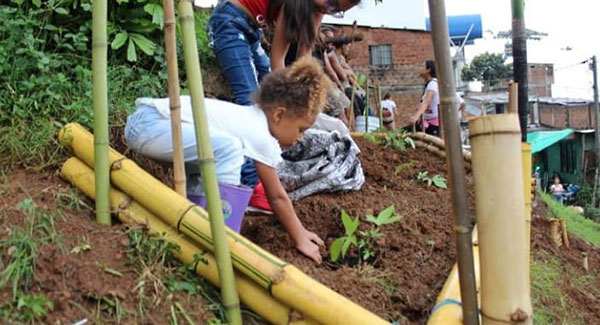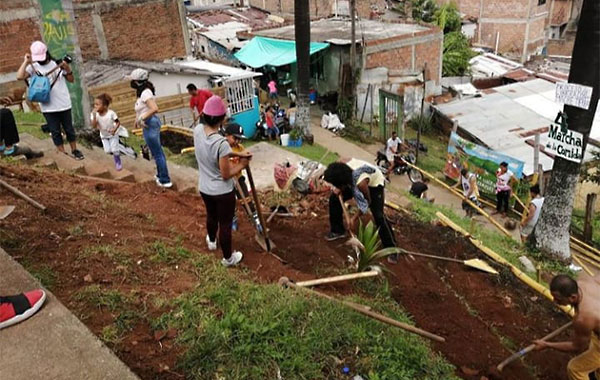Subtotal: $
Checkout
Urban Gardening in Siloé
Local leaders plant community gardens as an answer to violence and poverty.
By Harold Muñoz
November 2, 2021
Where there should have been a community garden in the La Piedra neighborhood, there was only rubble and weeds. No food will be harvested there and once again, hunger will flourish. The garden, begun as a resource for all, should have been taken care of by everyone. Yet it was in such a state of neglect that an apologetic resident emerged from his doorway to speak on behalf of his neighbors. “It’s just that with the strike, we’ve been busy with other things,” he explained to John Guevara, a community leader who is advising gardening efforts throughout Siloé, a low-income area in Cali, Colombia. John acknowledged the explanation without argument. He knows it is useless to argue when someone doesn’t want to do something. Furthermore, after a year of spearheading social projects from his own neighborhood of La Estrella, John has understood that community work is a constant dance of agreements and compromises. “The idea,” John reminded the resident before moving on, “is that you all take responsibility, hermano. That we all take charge of our bad situation.”
The event which eclipsed the community garden for the La Piedra residents was the Colombian national strike that began on April 28, 2021. The national government had proposed a tax reform which touched deep wounds and inflamed class hatred. Once again the state tried to close the fiscal gap, caused this time by the COVID-19 pandemic, by tightening the already-choking noose around the middle and working classes. Protests and riots broke out. Police attempts to control the situation often involved excessive force, which was frequently documented on protesters’ cell phones. The evidence of these abuses is undeniable; the Inter-American Commission on Human Rights stated as much in a report presented on July 5 before the Organization of American States.
The uprising was widespread and brought together numerous groups demanding social change, but a majority of the protesters came from the lower classes. In Cali, Siloé was an epicenter of unrest. The people there organized as they never had before and participated peacefully in the national strike. But this activism had actually been brewing long before the government announced the controversial tax reform. Last year, the Covid-19 pandemic gave birth to several community efforts designed to stave off starvation: in Latin America, the extended national shutdowns have arguably caused more suffering than the disease they were supposed to contain. People joined with their neighbors of their own accord to distribute lunches, cover childcare, and give art classes for people in need of a new income stream. These spontaneous ventures were eventually formalized into projects, which were brought together in a loose-knit organization called Banda Solidaria(Solidarity Group). Kevin Gutiérrez, who lives in the Los Mundos neighborhood, explains: “Many of us started projects so we wouldn’t be lost to the coronavirus. Some of us searched for new markets, others got into the artistic and cultural side of things. I started handing out free lunches to the homeless when everyone was scared to leave their houses.” It is telling that while the state’s response to the pandemic was to raise taxes, the community of Siloé, one of the worst affected by the shutdown and disease, responded with solidarity work.

Image courtesy of the author
It is worth mentioning that none of these community leaders are professional social workers. John Guevara welds iron structures and Kevin Guitérrez worked at a factory until he was let go amid the pandemic. Their backgrounds make their community work all the more noteworthy and explain what has happened in Siloé since the pandemic ran up its narrow streets. The people who have suffered the economic impacts of the virus have risen up and, by example, shown a possible path to change. It is the people who, intuitively, have tried to find a solution to the two principal problems they have suffered since time immemorable: violence and starvation.
One of these new ventures was to plant community gardens. With food shortages and income loss during the shutdown, people began to grow their own food at home or in their neighborhood’s public spaces. They took collections and generally helped their neighbors out, joining forces and resources to buy tools and seeds. “We didn’t want to depend on anyone,” said Adriana Moreno, a leader of both the San Francisco neighborhood and Banda Solidaria. “Not the government, not the supermarkets. And anyways, I’ve always liked gardening.” Adriana Moreno is younger than the other two leaders, and also unemployed. As a child, she took part in one of the Francisco Esperanza Youth Restoration Houses, a program of the Alvaralice Foundation which works to combat the marginalization of children in Cali’s poor neighborhoods. Thanks to that experience, Adriana recognizes, she has always had an affinity for helping others.
This form of resistance is reminiscent of Siloé’s origin. The neighborhood began as a shanty town – a so-called “invasion neighborhood” – on a precipitous hillside at the beginning of the twentieth century. Here, the only plentiful thing was land, which is why Siloé continues to grow, and why every so often new inhabitants arrive to occupy another plot. This is also why anyone can plant a garden in their patio or a public space. We saw one of the most successful gardens at the house of William, a resident of the La Estrella neighborhood. Tomatoes, plantains, and cilantro were planted in what seemed like a vertical garden, every plant a little balcony of sprouts. All the produce went to the soup kitchen run by the La Estrella Cooperative Group, a women-led community project born during the past year which provides free lunches for the whole neighborhood, mainly on Sundays. “Until now,” John Guevara explained, half worried, half smiling, “the garden’s main enemies have been cats. So we are going to make a covering that protects it.”
Nevertheless, there is more than one “cat” in Siloé that prevents the community gardens from taking firm hold throughout the area. When a garden is born, a group of volunteers from Banda Solidaria gets the ball rolling with a day of sowing and planting. The idea is that from then on the locals will take responsibility for maintaining the garden. However, as evidenced in La Piedra, this doesn’t always happen. The most problematic obstacle to community involvement is violence. It determines the timetables, deadlines, and viability of the service projects, which sometimes don’t survive because the environment is too hostile. “You have to win the trust of the people,” commented Adriana Moreno. “For example, you have to make them understand that while they are gardening, some gangster from another neighborhood won’t come and kill them.”
“Just a few days back,” recalled Yuli, wife of John Guevara and head of the kitchen of La Estrella Cooperative Group, “some armed gang members came to ask us to give them lunch.”
John added, “Here, the gangs guard the asses of people who don’t even feed them.”
This situation was glaringly obvious during the national strike. On May 3, 2021, a candlelight vigil was held in Siloé’s rotunda, the lowest part of the neighborhood. The organizers wanted to pay homage to people who had been killed during the protests, both by presumed police abuse and by the outsiders who infiltrated the marches to attack protesters. John, Kevin, and Adriana were all there that night. The three agree that the police ambush started around seven that evening. No matter that there were children participating in the vigil; the police shot at them from a government helicopter and nearby streets. There was tear gas, stun grenades, and smoke. Some people died and others were injured. “The people fled up the hill and the gangs started repelling the police attacks,” commented Adriana. And it wasn’t just the gang members. That same night, fueled by a mix of outrage and criminal interests, a mob set fire to all the police stations in the area. So the police abandoned Siloé and only returned two months later. In the absence of government law and order, criminal gangs staked out claims and dictated their own rules. The common people were at their mercy and faced with a dilemma: on the one hand was the police, whom they’d never trusted and often accused of corruption; and on the other hand were the gangs, which have established, in their own way, an apparent calm that could explode in their faces at any moment.

Image courtesy of the author
“There were excesses committed on both sides,” said Kevin Gutiérrez, who also admitted that any national strike, especially one as long as the one they’ve just been through, can be problematic. “There were excesses on the part of the police, and also some protesters who wanted to take advantage of the chaos. This is not the path forward. Marches are just an excuse to let the police kill you easily; and if they kill you, your community loses a leader who is working for the people. I prefer long-term processes, the community work that creates real change, little by little.” John and Adriana agree with him. They also participated in the strike during the first few days, but soon distanced themselves from it to save their own lives. They did not want to get caught up in some protesters’ rage, which was being used by criminal gangs who wanted to take control of the area.
“I have more trust in art than in our police,” said Kevin, despite the difficulties he’s had negotiating his projects over the past few months. His words sum up the decision that he and Siloé’s other leaders have made: instead of waiting for some outsider to save them, they are getting to work – with next to no resources – and choosing a process that is born in the community. Often, the community doesn’t take ownership and their initiatives end up fizzling. But more than a year ago, the pandemic knocked on their doors and mobilized them to resistance. Kevin, John, and Adriana have been working for their neighbors since then. They are still at it.
Translated from Spanish by Coretta Thomson.
Already a subscriber? Sign in
Try 3 months of unlimited access. Start your FREE TRIAL today. Cancel anytime.






